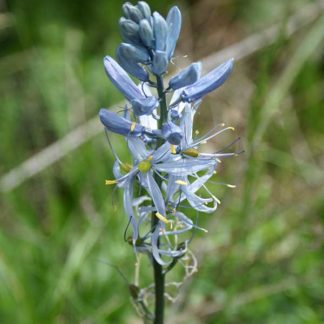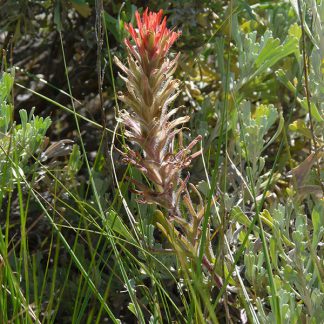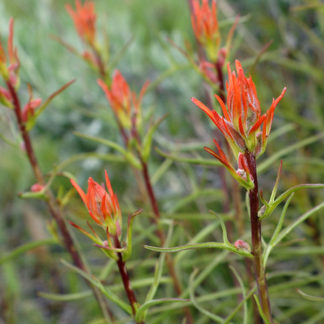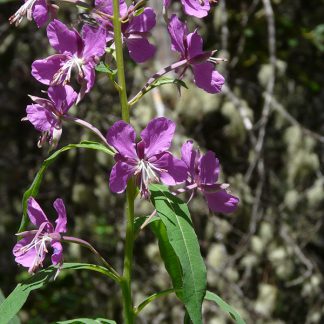normal
Showing 13–24 of 82 results
-

Camassia quamash / small camas
- immediately visible for its star-shaped blue flowers and yellow anthers
- flowers borne on a spike-like raceme, opening from the bottom up
- multiple flowers open at one time
- leaves are grass-like, growing from a bulb
- large seed capsules with ca. 30 roundish black seeds, ripe in late summer
-

Castilleja covilleana / Rocky Mountain paintbrush
- clearly, one of the "Indian paintbrushes"
- early bloomer in the spring, even when quite short
- bright red, orange (sometimes yellow) bracts
- bracts and leaves have 3-7 deep lobes with long, soft hairs
- often grows in clusters
-

Castilleja linariifolia / Wyoming Indian paintbrush
- generally taller than most paintbrushes (up to 3 feet)
- very thin leaves, seldom lobed, seldom hairy
- red inflorescence bracts, may be lobed
- flowers extend well beyond bracts
- calyx is red and shorter than the corolla which is greenish yellow
- rocky areas with sagebrush and conifer forests
-

Castilleja miniata / scarlet paintbrush
- bright red, or orange or sometimes yellow bracts that are mistaken for flowers
- looks like a red feather duster, but only a few inches long
- generally low, and along streams or roadsides on hills where there is moisture
- leaves ovoid with prominent veins, no petioles
-

Castilleja spp. / paintbrushes
- vibrant, red (or yellow) inflorescence (bracts)
- widespread, but confusing... five or more species in the area
-

Castilleja spp. / two yellow paintbrushes
- look like Indian paintbrushes (which they are), but yellow
- inflorescence bracts possibly lobed
- height ranges from less than 8" to about 15"
- subalpine, alpine and tundra habitats, in clumps or spread out
- linear leaves without lobes, 3 prominent veins
- red to maroon, hairy stems
-

Ceanothus velutinus / snowbrush
- waist-high, exposed evergreen shrub
- aromatic in hot weather or when leaves are crushed
- shiny (sticky) green leaves, ca. 3"; 3 prominent veins
- 4" clusters of teeny white/cream flowers
- in disturbed areas, particularly burned areas
-

Centaurea maculosa / spotted knapweed
- "vibrant" pink flowers
- dark tips on the sepals ("bud scales") - the "spotted" in the name
- biennial - rosette of leaves in first year
- officially a noxious weed
-

Chamerion angustifolium / fireweed
- bright pink flowers on tall inflorescence (raceme)
- flowers mature from bottom to top
- four petals
- spiral leaf arrangement - lance-shaped leaves have smooth edges
- pod-like seed capsule releases seeds to the wind
-

Clematis hirsutissima / hairy clematis
- striking, purple, upside-down vase
- four hairy sepals (not actually petals) fused to make the vase
- one flower per stem
- leaves divided into narrow leaflets
- moist or seasonally moist meadows
-

Convulvulus arvensis / field bindweed
- prostrate and twining vine with white "morning-glory" flowers
- may be so dense as to choke out other plants
- roadsides, agricultural fields, waste areas
- "noxious" in Idaho
-

Crataegus douglasii / black hawthorn
- slightly thorny shrub or small tree, to 30 feet
- often forms thickets
- broad leaves with toothed edges, clumped at ends of branches
- clumps of white, globe-shaped flowers in spring; prominent black anthers
- clumps of black "berries" in autumn
Showing 13–24 of 82 results